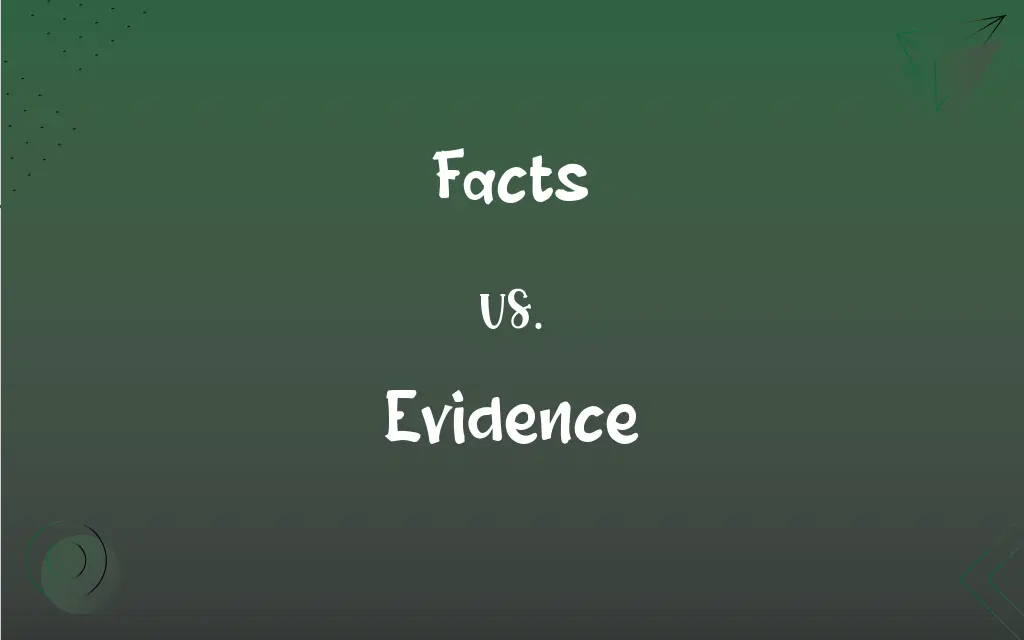Facts vs. Evidence: What's the Difference?
By Aimie Carlson & Janet White || Published on March 27, 2024
Facts are indisputable truths or realities, while evidence is information or data supporting or disproving a statement, hypothesis, or belief.

Key Differences
Facts stand alone as truths that are universally accepted and can be verified independently, such as the Earth orbiting the Sun. Evidence, on the other hand, is collected to support or refute claims, theories, or legal cases, and its strength can vary based on the context and quality. For example, fingerprints at a crime scene serve as evidence in a legal context.
The role of evidence is crucial in the process of establishing facts, especially in scientific research and legal proceedings. In science, evidence through experimentation and observation can lead to the establishment of facts over time. In law, evidence is gathered to prove or disprove the facts of a case, guiding the judicial decision-making process.
Facts are often used as a foundation for gathering evidence. For instance, the fact that a chemical reaction occurs under certain conditions can be used to predict outcomes and gather evidence in experiments. Conversely, evidence can lead to the establishment of new facts when it consistently supports a certain conclusion.
Facts are static and unchanging, evidence is dynamic and can evolve. New evidence can emerge that challenges existing beliefs, leading to the re-evaluation of what is considered a fact. This is common in scientific discovery, where new research can update or overturn previous understandings.
Comparison Chart
Definition
An indisputable truth or reality.
Information or data supporting or disproving a statement.
ADVERTISEMENT
Nature
Static and universally accepted.
Dynamic and can vary in strength.
Role
Serves as a foundation of knowledge.
Used to support or refute claims or beliefs.
Context
Stands alone without needing support.
Requires context for its relevance and strength.
Evolution
Remains constant unless proven otherwise.
Can evolve with new information or analysis.
Facts and Evidence Definitions
Facts
A piece of information about an event or reality that is universally accepted.
Water freezes at 0°C (32°F) under standard atmospheric conditions.
ADVERTISEMENT
Evidence
May evolve or change with new discoveries or technologies.
Advances in technology have enhanced the precision of radiometric dating methods.
Facts
Can be empirically verified through observation or measurement.
Humans have 46 chromosomes in each cell.
Evidence
Material or information used to support or refute a claim or hypothesis.
DNA evidence can link a suspect to a crime scene.
Facts
Remains true regardless of beliefs or opinions.
The Earth is an oblate spheroid.
Evidence
Plays a crucial role in scientific research and legal processes.
Evidence-based medicine relies on clinical evidence to make healthcare decisions.
Facts
Is not influenced by external factors or perspectives.
The speed of light in a vacuum is approximately 299,792 kilometers per second.
Evidence
Can be qualitative or quantitative in nature.
Statistical evidence shows an increase in global temperatures over the last century.
Facts
Forms the basis of knowledge and understanding.
Photosynthesis converts carbon dioxide and water into oxygen and glucose in plants.
Evidence
Its strength and reliability can be assessed.
Eyewitness testimony is considered less reliable than forensic evidence.
Facts
Knowledge or information based on real occurrences
An account based on fact.
A blur of fact and fancy.
Evidence
A thing or set of things helpful in forming a conclusion or judgment
The broken window was evidence that a burglary had taken place. Scientists weighed the evidence for and against the hypothesis.
Facts
Something demonstrated to exist or known to have existed
Genetic engineering is now a fact. That Chaucer was a real person is an undisputed fact.
FAQs
What is a fact?
A fact is a statement that can be proven to be true, based on empirical evidence or logical reasoning.
How do facts and evidence differ in their application?
Facts provide a foundation for knowledge and do not change unless disproven, while evidence is used to establish, support, or challenge facts and theories.
Can evidence become a fact?
Yes, when evidence consistently supports a conclusion without contradiction, it can lead to the establishment of a fact.
Why is evidence important in the legal system?
Evidence is crucial in the legal system as it helps to prove or disprove the facts of a case, thereby guiding the decisions of the judiciary.
What is evidence?
Evidence consists of information or data collected to support or refute a statement, theory, or belief.
What makes a piece of evidence reliable?
The reliability of evidence depends on its source, the method of collection, and its consistency with other pieces of evidence.
How does new evidence affect existing facts?
New evidence can challenge and potentially change existing facts if it consistently contradicts them, leading to a re-evaluation of what is considered true.
What types of evidence are used in scientific research?
Scientific research utilizes various types of evidence, including experimental data, observational studies, simulations, and theoretical models, to test hypotheses.
Is anecdotal evidence considered reliable?
Anecdotal evidence is not typically considered reliable due to its subjective nature and the risk of bias, and it lacks the rigor of empirical research.
How do facts and evidence interact in scientific research?
In scientific research, facts are used as the basis for forming hypotheses, and evidence is gathered through experimentation to support or refute these hypotheses.
What role does peer review play in validating evidence?
Peer review plays a crucial role in validating evidence by subjecting research findings to the scrutiny of other experts in the field, ensuring accuracy and reliability.
Why is evidence crucial in forming a scientific consensus?
Evidence is crucial in forming a scientific consensus because it allows the scientific community to agree on conclusions based on the weight of empirical support.
Can the same evidence support multiple theories?
Yes, the same evidence can support multiple theories, especially in cases where the evidence is not conclusive, leading to different interpretations.
Are all facts considered evidence?
While facts can support claims and hypotheses, they are not evidence themselves; they are the truths that evidence aims to establish or refute.
Can a fact ever be disproven?
A fact can be reconsidered or disproven if new, reliable evidence contradicts the existing understanding, leading to a revision of what is considered true.
What is the difference between direct and circumstantial evidence?
Direct evidence directly proves a fact, such as eyewitness testimony, while circumstantial evidence requires an inference to connect it to a conclusion.
How do legal professionals assess the quality of evidence?
Legal professionals assess the quality of evidence based on its relevance, credibility, reliability, and the manner in which it was obtained, ensuring it meets legal standards.
How do facts contribute to theories?
Facts contribute to theories by providing the empirically verified information that theories attempt to explain, predict, and connect in a coherent framework.
How does cultural context affect the interpretation of facts and evidence?
Cultural context can influence the interpretation of facts and evidence by shaping perspectives, biases, and the understanding of what is considered true or relevant.
What role does evidence play in decision-making?
Evidence plays a critical role in decision-making by providing a basis for informed choices, whether in science, law, or everyday life.
About Author
Written by
Aimie CarlsonAimie Carlson, holding a master's degree in English literature, is a fervent English language enthusiast. She lends her writing talents to Difference Wiki, a prominent website that specializes in comparisons, offering readers insightful analyses that both captivate and inform.
Co-written by
Janet WhiteJanet White has been an esteemed writer and blogger for Difference Wiki. Holding a Master's degree in Science and Medical Journalism from the prestigious Boston University, she has consistently demonstrated her expertise and passion for her field. When she's not immersed in her work, Janet relishes her time exercising, delving into a good book, and cherishing moments with friends and family.
































































